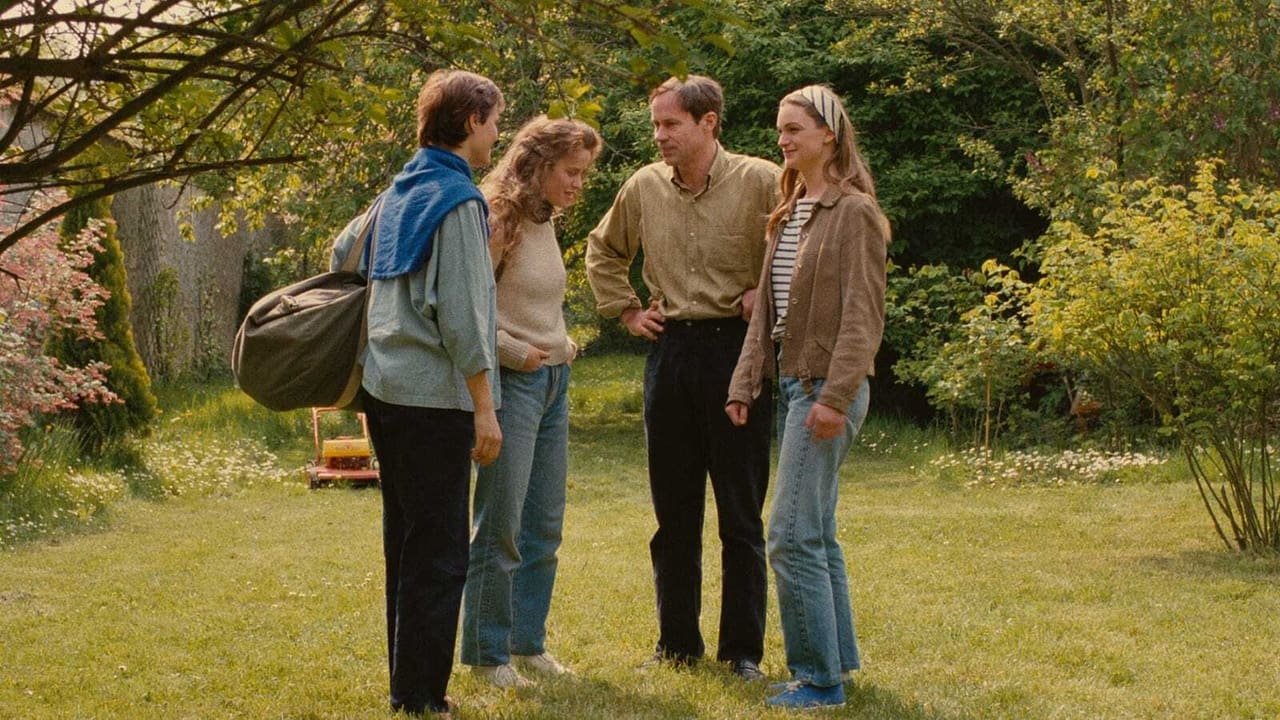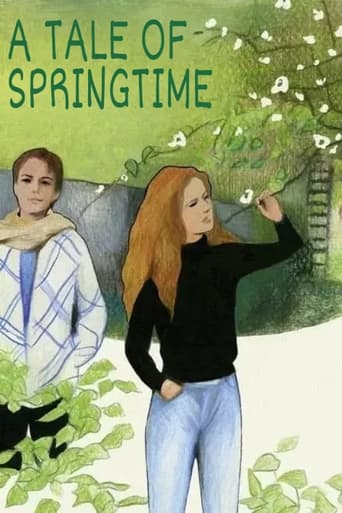

What a waste of my time!!!
... View MoreI gave it a 7.5 out of 10
... View MoreFantastic!
... View MoreBetter Late Then Never
... View MoreWhen the story begins, Jeanne is at a party where she meets Natacha. They talk for a bit and Jeanne mentions how she is temporarily unable to use her apartment and she hates to stay at her boyfriend's place when he is away. Soon, Natacha asks Jeanne home and she agrees. The two seem to get along just fine, though as the story progresses, it seems that Natacha has some serious issues with women--in particular, he mother and her father's girlfriends (the parents are divorced). It also seems possible that Natacha has a plan--to try to get her new friend Jeanne and her father together.While I do not expect films to have happy endings, I do expect that by the end there would be some sense of resolution or at least an indication as to where the story would go. However, in "A Tale of Springtime", the film just seems to end--and this frustrated me to no end. This is because the film really had some fine acting, nice camera-work and the basic things needed for an interesting story...but then, nothing! It's a shame, as with a more well-defined ending, I would have scored this one a 7 or even 8. The basic story was very nice--it just seemed like when they ran out of film, they just ended the story! And, with several important points unresolved, it was a bad way to end it.
... View MoreFrom the beginning of this film to the end Jeanne is constantly displaced. The first scene has her returning to her own apartment after a long absence to find the cousin she was allowing to borrow the place is still there in spite of her agreement to leave a day or two previously. Although she desperately wants to return to the order of her own place she pretends that she was just stopping by to pick something up on her way back to the place she shares with her out of town boyfriend. However, she does not feel comfortable returning to this disordered place so to avoid it as long as possible she goes to the party of a former acquaintance. Here she meets Natasha and the plot gets started.Natasha lives alone in a big apartment and she invites Jeanne to stay with her a few days. Jeanne mostly feels out of place here as well but her two day stay stretches into something like ten before she is finally able to return home. During this time she grows increasingly agitated which causes her to act distrustful and paranoid. Unfortunately, her new friend Natasha is acting much the same way toward her father's current love interest and the combination of a negative atmosphere and her own paranoia put her in a rather unpleasant situation.In spite of the general tension of the plot, A Tale of Springtime ends on a very upbeat note that suggests most of the distrust the characters felt toward one another was unfounded. Indeed, the blossoming of new relationships and the general happiness of the characters make Spring a fitting setting for the film. Still, I couldn't help but feel that this wasn't one of Rohmer's strongest efforts: sure, the characters were just as natural as ever and the dialog was even more chock full of interesting ideas than usual but the cinematography wasn't all that special. All things considered, I would say this was quite good but nowhere near the best Rohmer has offered.
... View MoreIt may seem strange that with all the great Rohmer films to choose from, that this would be my favorite. After all, it is a slow moving film, with a threadbare plot, even by Rohmer standards, and yet completely enchants me. Jeanne, the main character, is an ordinary, middle-class woman, at the start of her career as a teacher, at the start of a relationship with Mathieu (whom we never see) still trying to figure her life out. She recognizes her own shortcomings, she thinks too much, she's not able to confide in others and she is sometimes too accommodating to people. Yet she is a noble character, with great integrity and kindness.There is a wonderful little scene in Natasha's apartment. Jeanne is grading papers in the dining room as Natasha comes home from school, and in the kitchen, the living and Natasha's bedroom are flowers Jeanne has bought to thank Natasha for her kindness. Natasha, in return, is so touched by Jeanne's act of kindness that she can barely contain herself. This one little scene shows so much. Jeanne's dedication as a teacher, her kindness to people, and flowers to herald in the first days of spring.As their situations develop, and really there is no reason to speak of the plot, there is a deepening bond as the viewer spends more time with the characters, in simple things, doing simple chores, cutting potatoes, folding clothes, listening to music, and paying attention to what is said, and not said, in their conversations, and at the end of the movie, you seem to have made some very good friends. It's a wonderful thing to be touched by art, but it is more wonderful, I think, to be touched by ordinary life and ordinary people. By not attempting to, Rohmer has made a masterpiece.
... View MoreThis is not my favourite of the 4 Season's tales - I prefer both Autumn and Summer to this one. And it is almost a master class in deficiencies in the British education system, when the main characters can (very convincingly) argue the differences between Kantian perception over lunch, and when Jeanne, the teacher, defends philosophy at secondary school as teaching you how to live. And indeed she seems to be fine with a rather strange situation, being essentially courted by a daughter on behalf of her father (and in fact Rohmer takes up this theme again in Autumn when a woman does date someone as a proxy for her friend). It is a film that requires slow contemplation and which doesn't open up its secrets easily - rather like the location of the necklace, the Hitchcockian MacGuffin which is but a pretext for the poisonous atmosphere between the two girls and whose eventual revelation changes nothing in the basic situation.
... View More